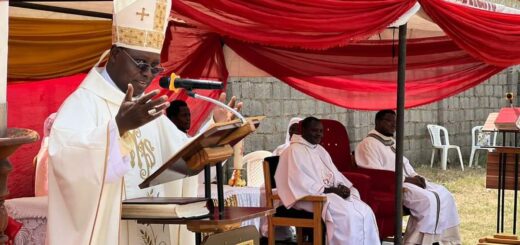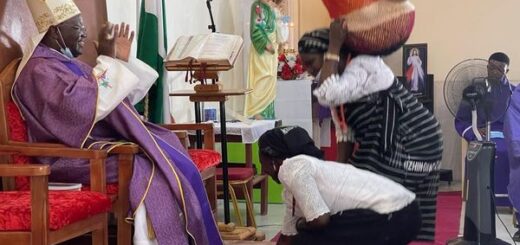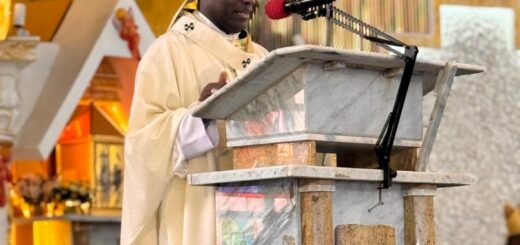Faithfulness in Suffering
by ARCH BISHOP · August 30, 2020
22nd Sunday, Homily by Archbishop I. A. Kaigama, 30th August, 2020, Our Lady Queen of Peace Parish, Utako, Abuja
Readings: Jeremiah 20:7-9; Ps. 63:2, 3-4, 5-6,8-9; Romans 12:1-2; Matthew 16:21-27
I salute you dear parishioners of Our Lady Queen of Peace Parish, Utako, together with your Parish priest, Fr. Jude Oniah and his assistant, Fr. Francis Umar. Your parish is my first point of call since the ceremony on Thursday of the imposition of the Pallium on me presided by the Apostolic Nuncio, Archbishop Antonio Guido Filipazzi, on behalf of the Holy Father. The Pallium is the symbol of communion with the Pope and a sign of unity here in our Archdiocese and Ecclesiastical Province.
On the feast of Assumption, there was palpable joy among friends, parents, parishioners and indeed, the whole Archdiocese as we ordained seven priests, fresh labourers for the Lord’s vineyard. We encouraged the new priests to be strong in faith, selfless in service, and urged them to key into the pastoral initiative of the new pastoral areas; to go forth like the 72 disciples sent in Luke chapter 10 with no material resources but to stay with the people whether poor or socially deprived. They all expressed willingness to do all it takes to bring the gospel of salvation without counting the cost to people who live in the towns or in the rural neglected villages. Their names will be written in heaven if they are faithful to this promise. So also will all our names be written in heaven if we love, serve and adore the Lord our God and love our brothers and sisters without preconditions, discrimination or barriers; to love with the love of Jesus.
After the euphoria of priestly ordination, the task before the priest is demanding. In our readings today, Jeremiah, Peter and Jesus teach us how those called must be prepared to suffer while remaining faithful to God. The Psalmist expresses that there will be obstacles on the way for those who are just and those who want to do God’s will. They will face opposition from those who find the word of God bitter and unpleasant. The story of John the Baptist who was beheaded because he told King Herod that he was wrong in marrying Herodias his brother’s wife is well known.
In the first reading, we read about the lamentations of the prophet Jeremiah in the face of suffering and rejection from his fellow countrymen. Jeremiah was commissioned by God to tell the people of Judah and Jerusalem that their transgressions would bring God’s wrath upon them resulting in a future defeat by their enemies, leading to the fall of the Kingdom and exile. He was accused of treason; arrested, imprisoned and tortured. He became a laughing stock in the city and suffered isolation and was threatened with execution. Out of frustration, Jeremiah cried out, “You deceived me, Lord and I was deceived; you overpowered me and prevailed” (Jer. 20:7). Jeremiah wanted to abandon his prophetic call, but God’s word was like a burning fire in his heart and he was compelled to speak about the calamities that would befall his people because of their stubbornness.
Our Lord Jesus knew suffering, distress and anguish from the Jewish political and religious authorities, and even his kinsmen, but he remained faithful, to his Father’s will to the end. Rather than consent to the counsel of Peter to avoid the way of the cross, Jesus called him “Satan”, meaning an “adversary” opposed to God’s plan, and so Jesus told him to “get behind” to allow God’s plan to unfold. Jesus is teaching us that there cannot be Christianity without the cross.
Millions of Christians want to enjoy Jesus miracles and get instant answers to their problems of finances, fertility, employment and sickness; but we must realize that there are dark moments and sometimes suffering will not go away no matter how much we pray. Like that man knocking persistently at the door of his friend at night (cf. Lk 11:5-8), we must keep knocking in faith and God’s door will open at His own time.
St. Paul advises in the second reading to offer ourselves, as a living sacrifice, by not only accepting our sufferings but embracing them, courageously facing the challenges of everyday life, taking up our crosses to follow Jesus to the very end.
We must not give God conditions or grow rebellious, disappointed or frustrated when we feel our prayers are not answered. When we pray, we should know that God’s grace is sufficient for us (cf. 2 Cor. 12:9) and we shouldn’t despair and feel that God is absent.
The Catechism of the Catholic Church number 2015 aptly teaches that the way of perfection passes by the way of the cross. A Christianity that promises only fortunes, miracles and prosperity ignores what St. Rose of Lima said that, “the Cross is the only ladder by which paradise is reached; without the cross there is no road to heaven”.
Dear Brothers and sisters, in the cross lies our salvation.




